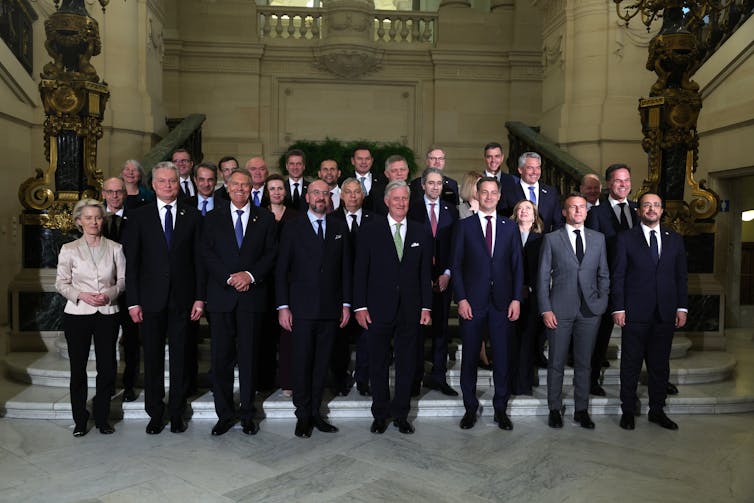Some believe that the war in Ukraine has fundamentally changed Europe, giving birth to a different kind of European order. That is, it appears to be driving structural shifts in the way Europe is run and organised that extend well beyond the immediate imperative of helping Ukraine fight the war. European integration is deepening in some areas, like defence and security, and the EU looks set to extend its geographical borders to take in new members.
Reflecting this, EU leaders, politicians and writers typically compare the 2022 invasion with the inflection points of 1945 and 1989. Each of these put in place new organisations and rules that redefined European cooperation, politics, economics and security. The end of the cold war in 1989 was a catalyst for deeper European integration and opened the way to bringing many eastern European states into the EU.
Yet, the current process of re-ordering remains tentative. The EU collectively, and European governments individually, have agreed a significant amount of policy adjustment. In particular, governments have increased defence spending and the EU has launched dozens of new security initiatives. How far this constitutes a shift in the European order remains uncertain, however.
Many of the policy changes underway might be judged as welcome, necessary, and overdue so that Europe can adapt judiciously to the strategic imperatives of a more corrosive and fractious era. But the changes so far have been ad-hoc and expedient, bereft of any clear framework for structuring a new, post-war European order. They do not, in themselves, constitute a coherent or deeply rooted vision for a stronger and strategically adept Europe. Yet, this is what’s needed to address the challenges that the tragedy in Ukraine will leave in its wake.

Some changes do point towards possible shifts in the European order. European borders are being redrawn to bring in new member states. After years of keeping Ukraine, Modlova and Georgia outside, the EU has concluded that it is strategically important to begin accession talks with these states. The EU has strengthened its commitments to democratic norms as the Russian invasion has made the threat of authoritarian power more painfully tangible. It has also accelerated many aspects of its climate transition policies in response to the conflict, which has demonstrated the urgency of weaning Europe off strategically costly hydrocarbon dependencies.
Yet governments and EU institutions remain in short-term crisis mode. The flurry of EU policy change has yet to translate into a clear overarching strategy for a redesign of the European order. For now, the idea that the war has “changed everything” in Europe looks like an unwarranted exaggeration.
A ‘geoliberal’ Europe
Despite multiple reform proposals, the basic institutional shape of the EU remains untouched. Countries currently hoping to join the EU are being kept waiting in drawn out, technocratic processes despite the dangers they face from Russia.
Governments have bolted increased defence spending onto existing EU policies in response to the war without clarifying how these relate to the union’s supposed core liberal and peace-oriented principles. European leaders now ritually boast that the EU has become a toughened geopolitical power because of its response to Ukraine, but this does not seem to extend to having a position on engagements in places like the Sahel or the conflict in Gaza.
If anything, the war’s cruel continuation may actually be weakening the foundations and core principles of European order in some senses. It presents challenges of such immediacy that it has forced individual governments into defensive measures that reflect their own immediate, individual interests. But these potentially militate against coordination between nations.
For now, the EU appears stuck in an “in-between” period. Many of the union’s old organising principles, like the notion of its blurred internal borders, are no longer fit for purpose but governments lack the necessary political conviction to usher in a clearly defined new order.
EU leaders need to move towards what might be termed a geoliberal Europe. As mapped out in my new book, this would reflect geopolitical reality but also the liberal and democratic values that are supposed to define Europe and supposedly sit at the heart of the war’s rationale. This would take Europe out of crisis mode and enable it to map out a new, post-war approach to order. While this is lacking, the day-to-day debates about whether the EU is “doing enough” to help Ukraine will lack the necessary strategic orientation and anchoring.

